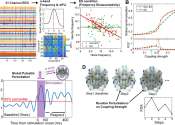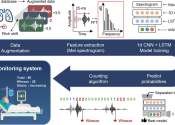Last update:
Diseases, Conditions, Syndromes news
Medical research
Study reports new compound that halts replication of COVID by targeting 'Mac-1' protein in cell models
Research appearing in the Journal of Medicinal Chemistry shows for the first time SARS-CoV-2, the virus responsible for COVID-19, can be inhibited from replicating in living cell cultures using a compound that targets "Mac-1," ...
13 hours ago
0
37
Diseases, Conditions, Syndromes
Study confirms effectiveness of bivalent COVID-19 vaccine
A major bivalent COVID-19 vaccine induces production of neutralizing antibodies against the coronavirus that circulated at the start of the pandemic as well as subvariants of omicron, albeit less abundantly, according to ...
11 hours ago
0
27
Researchers publish final results of key clinical trial for gene therapy for sickle cell disease
In a landmark study, an international consortium led by researchers at Children's Hospital of Philadelphia (CHOP) published the final results of a key clinical trial of the gene therapy CASGEVY (exagamglogene autotemcel) ...
19 hours ago
0
19

Study reveals racial disparities in COVID-19 testing delays among health care workers
At the height of the pandemic, timely access to COVID-19 testing was crucial for curbing the spread of the disease and informing treatment decisions. Studies have unveiled racial and ethnic disparities in COVID-19 infection ...
13 hours ago
0
1

Treatment for deadly superbug C. diff may be weakening
The antibiotic vancomycin, recommended as first-line treatment for infection caused by the deadly superbug C. difficile (C. diff), may not be living up to its promise, according to new research from the University of Houston ...
15 hours ago
0
2

Improving health communication to save lives during epidemics
During epidemics of Ebola, COVID-19, Zika and other public health emergencies, effective communication of public health messages is crucial to control the spread of disease, maintain public trust, and encourage compliance ...
10 hours ago
0
0

Antimicrobial-resistant hospital infections remain at least 12% above pre-pandemic levels, study finds
Despite progress in combating antimicrobial resistance (AMR) in the U.S. since its peak during the COVID-19 pandemic, hospital-acquired AMR infections remain well above pre-pandemic levels, according to a major new study ...
10 hours ago
1
0

Study: Antibiotic use in patients hospitalized with COVID-19 appears to have no beneficial effect on clinical outcomes
Antibiotic treatment of adults hospitalized with moderate COVID-19 is associated with clinical deterioration, despite the drugs being given to over 40% of patients, according to new research being presented at this year's ...
10 hours ago
0
16

Researcher discusses importance of communicating to the public during a pandemic, and the personal risk it can entail
In global crises like the COVID-19 pandemic, it is vital that scientists step forward to engage with the public and help deliver medical and scientific advice in a friendly, digestible and open format. While the traditional ...
10 hours ago
0
0

Study reports chlamydia and gonorrhea more likely to be treated per CDC guidelines in certain populations
Chlamydia and gonorrhea are the two most common sexually transmitted infections (STIs) in the United States, impacting 2.4 million in 2021, and the number is rising.
11 hours ago
0
0

Study uncovers drug target in a protein complex required for activation of NF-κB
A new paper by Dana-Farber Cancer Institute scientists lays the foundation for targeted therapies to inhibit the activation of nuclear factor kappa B (NF-κB), a transcription factor that plays a role in various autoimmune ...
12 hours ago
0
0

New tool helps identify babies at high risk for RSV
A new tool to identify infants most at risk for severe respiratory syncytial virus (RSV) illness could aid pediatricians in prioritizing children under age 1 to receive a preventive medication before RSV season (October-April), ...
12 hours ago
0
0

Q&A: Scientist who helped design R21 anti-malaria vaccine reflects on 30 years of research, and what it promises
Until three years ago nobody had developed a vaccine against any parasitic disease. Now there are two against malaria: the RTS,S and the R21 vaccines.
16 hours ago
0
0

Experts call for global genetic warning system to combat the next pandemic and antimicrobial resistance
The COVID-19 pandemic turned the world upside down. In fighting it, one of our most important weapons was genomic surveillance, based on whole genome sequencing, which collects all the genetic data of a given microorganism. ...
23 hours ago
0
0

Japanese study finds increase in home death ratio during the COVID-19 pandemic
A new study has revealed the increased home death ratio in Japan during the coronavirus disease 2019 (COVID-19) pandemic. High population density, large numbers of patients infected with COVID-19, and areas with numerous ...
15 hours ago
0
0

Malaria is still killing people in Kenya, but a vaccine and local drug production may help
As the coffin bearing the body of Rosebella Awuor was lowered into the grave, heart-wrenching sobs from mourners filled the air. Her sister Winnie Akinyi, the guardian to Awuor's orphaned son, fell to the ground, wailing.
23 hours ago
0
0

Bird flu in humans? Experts see little risk
The discovery of traces of the bird flu virus in pasteurized cow milk in the United States sparked questions over whether the disease could spread to humans, but experts say there is little risk from food contamination.
Apr 25, 2024
0
0

Climate change is bringing malaria to new areas. In Africa, it never left
When a small number of cases of locally transmitted malaria were found in the United States last year, it was a reminder that climate change is reviving or migrating the threat of some diseases. But across the African continent ...
Apr 25, 2024
0
0

Alteration of brain network condition could predict painful vaso-occlusive crisis in patients with sickle cell disease
A new study led by Indiana University School of Medicine researchers has found that a brain network condition called "explosive synchronization" could be the cause of extreme pain crises in people with sickle cell disease.
Apr 24, 2024
0
28

New algorithm could provide early warning for asthma attacks
A University of Texas at Dallas researcher and his international colleagues have developed an algorithm that might one day provide early medical alerts about the onset of asthma attacks or other respiratory problems.
Apr 24, 2024
0
1




















